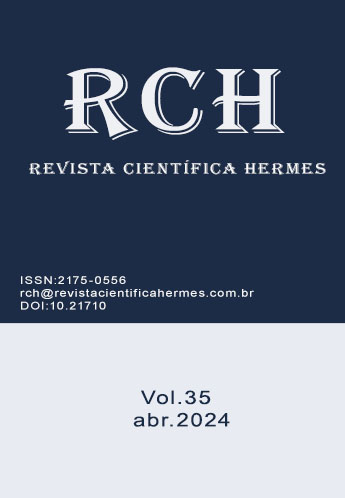As Emendas Parlamentares no Contexto do Orçamento Público:
Alocação de Recursos no Governo Federal 2019-2020
DOI:
https://doi.org/10.21710/rch.v35i1.680Palavras-chave:
emendas parlamentares, econômica-financeira, sociopolítica, presidencialismo de coalizãoResumo
No Brasil a Lei Orçamentária Anual (LOA) também deve ser aprovada pelo Poder Legislativo. É no momento da passagem pelo legislativo que podem ser apresentadas as emendas parlamentares, ou seja, alterações ou proposições no orçamento anual feitas diretamente pelos deputados e senadores. Essas emendas suscitam debates acerca do orçamento público do Governo Federal. Parte-se do entendimento de que o orçamento público é um instrumento tecnopolítico, e essa concepção ampla desafia a prática orçamentária e ajuda a explicar o papel das emendas parlamentares no processo alocativo brasileiro. Assim, o artigo objetiva caracterizar as emendas parlamentares do orçamento do Governo Federal, no período de 2019 a 2020, na perspectiva das dimensões econômico-financeira e sociopolítica. Para tanto, realizou-se pesquisa do tipo exploratória e descritiva, valendo-se teoricamente da discussão do presidencialismo de coalizão para compreender os arranjos das emendas no quadro do orçamento público e das pesquisas documental e bibliográfica como meios de investigação. Em termos de unidade da federação, a região sudeste obteve maior volume de recursos, mas em termos populacionais essa é a maior região do país. Observa-se que prioritariamente se destinam para a saúde, sendo uma imposição da EC nº 86/2015, mas também constam prioritariamente assistência, urbanismo, administração e educação.
Referências
Abranches, S. (2018), Presidencialismo de coalizão: raízes e evolução do modelo político brasileiro. São Paulo: Companhia das Letras.
Abranches, S. H. H. de (1988), “Presidencialismo de coalizão: o dilema do institucionalismo brasileiro”, Revista de Ciências Sociais, 31(1), 5-34.
Almeida, D. P. B. de (2021), “O mito da ineficiência alocativa das emendas parlamentares”, Revista Brasileira de Ciência Política, 34, 1-42. DOI: https://doi.org/10.1590/0103-3352.2021.34.239518
Agência Brasil (2021), Congresso aprova Orçamento da União para 2020. Retrieved April 30, 2021 from https://www12.senado.leg.br/noticias/materias/2019/12/17/congresso-aprova-orcamento-da-uniao-para-2020.
Angélico, Fabiano (2015), Lei de acesso à informação. São Paulo: Estúdio Editores, 2015.
Brasil (2021a), Câmara dos Deputados, Raio X do orçamento. 2021. Retrieved April 05, 2021 from https://www2.camara.leg.br/orcamento-da-uniao/raio-x-do-orcamento-previdencia/raio-x-do-orcamento
Brasil (2021b), Lei n. 4.320, de 17 de março de 1964. Establishes general standards of the financial law regarding the elaboration and control of the budgets and financial statements of the Brazilian federal government, states, municipalities, and federal district. Retrieved May 26, 2021, from http://www.planalto.gov.br/ccivil_03/leis/l4320.htm
Brasil (2021c), Constituição da República Federativa do Brasil. 1988. Retrieved May 24, 2021 from http://www.planalto.gov.br/ccivil_03/constituicao/constituicao.htm
Brasil (2021d), Emenda Constitucional n. 86, de 17 de março de 2015. Amends articles 165, 166, and 198 of the Brazilian Federal Constitution to make it mandatory to execute the budget program as specified. Retrieved May 24, 2021, from http://www.planalto.gov.br/ccivil_03/constituicao/Emendas/Emc/emc86.htm
Brasil (2021e), Emenda Constitucional n. 100, de 26 de junho de 2019. Amends articles 165 and 166 of the Brazilian Federal Constitution to make it mandatory to execute the amends to the public budget made by state (and federal district) parliamentary groups. Retrieved April 06, 2020 from http://www.planalto.gov.br/ccivil_03/constituicao/Emendas/Emc/emc100.htm#art1
Brasil (2024), Emenda Constitucional n 126, de 21 de dezembro de 2022. Retrieved 26 ago 2024 from https://www.planalto.gov.br/ccivil_03/constituicao/emendas/emc/emc126.htm
Costin, C. (2010), Administração Pública. Rio de Janeiro: Elsevier.
Couto, L. F.; Cardoso Jr., J. C. (2018), “Governança orçamentária: transformações e lacunas nas práticas de planejamento e orçamento no Brasil”, Boletim de análise político-institucional, n. 19.
Giacomoni, J. (2012), Orçamento público. São Paulo: Atlas.
Pereira, C.; Mueller, B. (2002), “Comportamento estratégico em presidencialismo de coalizão: as relações entre Executivo e Legislativo na elaboração do orçamento brasileiro”, Dados, 45(2), 265-301. DOI: https://doi.org/10.1590/S0011-52582002000200004
Pires, V. (2011), Orçamento público: abordagem tecno-política. Araraquara.
Ramos, A. G. (1981), Problemas alocativos da economia brasileira, Jornal do Brasil, 2, ago..
Rocha, A. C. (2008), O processo orçamentário brasileiro como instrumento de accountability. In: Encontro de administração pública e governança, 3., 2008, Salvador. Anais... Maringá: ANPAD.
Siga Brasil (2021), SIGA Senado. Retrieved April 27, 2021 from http://www9.senado.gov.br/QvAJAXZfc/opendoc.htm?document=senado%2Fsigabrasilpainelcidadao.qvw&host=QVS%40www9&anonymous=true&Sheet=SH14
Volpe, R. A. (2019), “O papel das emendas parlamentares no presidencialismo de coalizão: análise da execução antes e após o Orçamento Impositivo (EC 86/2015)”. Cadernos Aslegis, 56, 83-118.
Downloads
Publicado
Como Citar
Edição
Seção
Licença
Copyright (c) 2023 Elaine Cristina de Oliveira Menezes, Fabiano Raupp, Ana Rita Sacramento, Renata Nogueira

Este trabalho está licenciado sob uma licença Creative Commons Attribution 4.0 International License.






